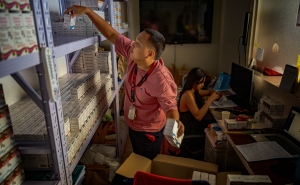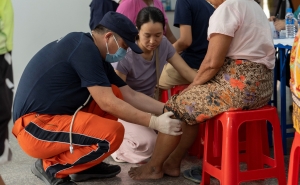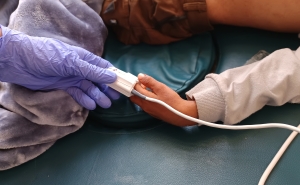Bloomberg School Faculty Statement on Lancet Commission Report on Malaria Eradication
The Lancet Commission on malaria eradication issued a report Sept. 8 that posits that malaria, one of the world’s oldest and deadliest diseases, can be eradicated as early as 2050. The Lancet Commission report includes a linked comment by Tedros Adhanom Ghebreyesus, PhD, MSc, Director-General of the World Health Organization, noting that malaria eradication will not be achieved within this 2050 time frame with the currently available tools and approaches.
Bill Moss, MD, MPH, professor and executive director of the International Vaccine Access Center at the Johns Hopkins Bloomberg School of Public Health, comments below on the Lancet Commission on malaria eradication report. Moss is also a deputy director at the Johns Hopkins Malaria Research Institute at the Bloomberg School.
“The Lancet Commission on malaria eradication report, published yesterday in The Lancet, is a call to arms in the fight against malaria. They state that malaria eradication is possible by 2050 with the right tools, strategies, and sufficient funding, a conclusion reached through new models that forecast malaria trends over the next three decades. Such a call, with a target date for eradication, is a rallying cry to intensify the commitment in the fight against malaria by increasing investment, promoting research, and strengthening malaria control programs. This may seem in contrast to the recently released Executive Summary of the World Health Organization Strategic Advisory Group of Experts on Malaria Eradication, which did not call for an eradication goal or timeline. However, the debate is not really about the fight against malaria. Both groups agree that malaria continues to be an enormous public health problem, particularly in sub-Saharan Africa, and should be defeated. The difference lies in the strategy, specifically the pros and cons of setting a formal eradication goal and timeline.
Such goals may increase resolve and investment but, as we have learned from the Global Polio Eradication Initiative, are increasingly difficult to sustain in the long term and can lead to loss of political and public commitment as the disease burden decreases. Many factors outside of having the right tools, strategies and sufficient funding can derail eradication efforts, including conflict, political instability, misinformation, and mistrust, in addition to the challenges of modeling a complex disease such as malaria out for several decades. We all agree that malaria needs to be defeated. Whether a timebound goal, so far in the future and deferred to the next generation of malariologists and public health workers, will spur our efforts remains to be seen.”
To learn more about the Johns Hopkins Malaria Research Institute, click here.
# # #
Media contacts for the Johns Hopkins Bloomberg School of Public Health: Barbara Benham at 410-614-6029 or bbenham1@jhu.edu and Robin Scullin at 410-955-7619 or rsculli1@jhu.edu.





